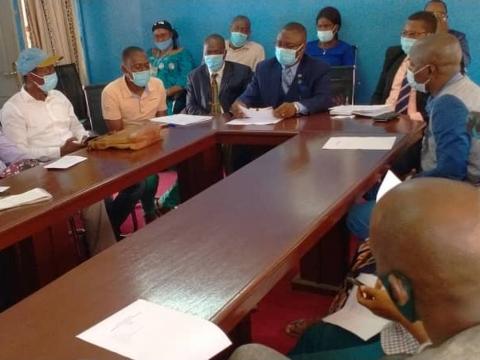By Politico staff writer
The Society for Democratic Initiatives (SDI) has in a one-day information session engaged public information officers on the Right to Access Information law and its significance in ensuring accountability and transparency during the COVID-19 pandemic.
The Executive Director of SDI, Emmanuel Saffa Abdulai, said the process leading to the ratification of the Right to Access Information (RAI) law in 2013 lasted more than 10-years, noting that its successful implementations and public awareness lives on.
“It was arduous but ultimately very successful and now the work continues to educate people about the law, making sure people understood the law and how to use the law to hold authorities to account.”
The Deputy Minister of Information and Communications, Mamadi Gobeh-Kamara, said the RAI Act guarantees access to government information and imposes a penalty on those who fail to make information available because “access to information is a cornerstone of modern democracies and a fundamental human right under international law and also enshrined in our Constitution.
She added that Public information and records are a means of power that governments and other political institutions use to exercise control over citizens, but can also be a means of empowering citizens. With information, the media can play their watchdog role and people can adequately assess the performance of the government and hold it accountable.
The Deputy Minister cited the recent Auditor General’s Report on COVID-19 funds and the actions of the Anti-Corruption Commission as examples of how institutions can be held to account through transparency.
The Secretary General of the Sierra Leone Association of Journalists (SLAJ), Asmieu Bah, said SLAJ was relieved when the RAI law was passed and with the repeal of Part 5 of the Public Order Act relating to criminal and seditious libel, journalists will feel emboldened to undertake true investigative reporting.
“But, gaining access to information has always been a challenge. No more will doors be shut on reporters looking for information. The RAI law allows journalists to seek information, do research and hold agencies and authorities to account,” he said.
The Assistant Public Relations Officer of the ACC, Morris Ibrahim Kanteh, said that accessing public information can only be done when there are proper records management systems in place. “The culture of record keeping, documentation, information systems and filing is generally inadequate in most government offices. The ACC has worked with numerous groups to help develop information systems and digitize records so they can be accessed by journalists or any other people.”
The Commissioner of the RAIC, Dr. Ibrahim Seaga Shaw, said that implementation remains a challenge in Sierra Leone amidst the many good laws and policies.
He added: “We’re working with the ACC and many others to reduce corruption by holding Agencies, Ministries and government to account through access to information.” Dr. Shaw said MDA should have a Public Information Officer whose sole job is to respond to requests for information.
The event held at the Hill Valley Hotel, in Freetown and jointly organized by SDI and Freedom of Information Coalition, brought together Public Information Officers from Ministries, Departments and Agencies of Government, civil society representatives and media practitioners.
Copyright © 2021 Politico Online








